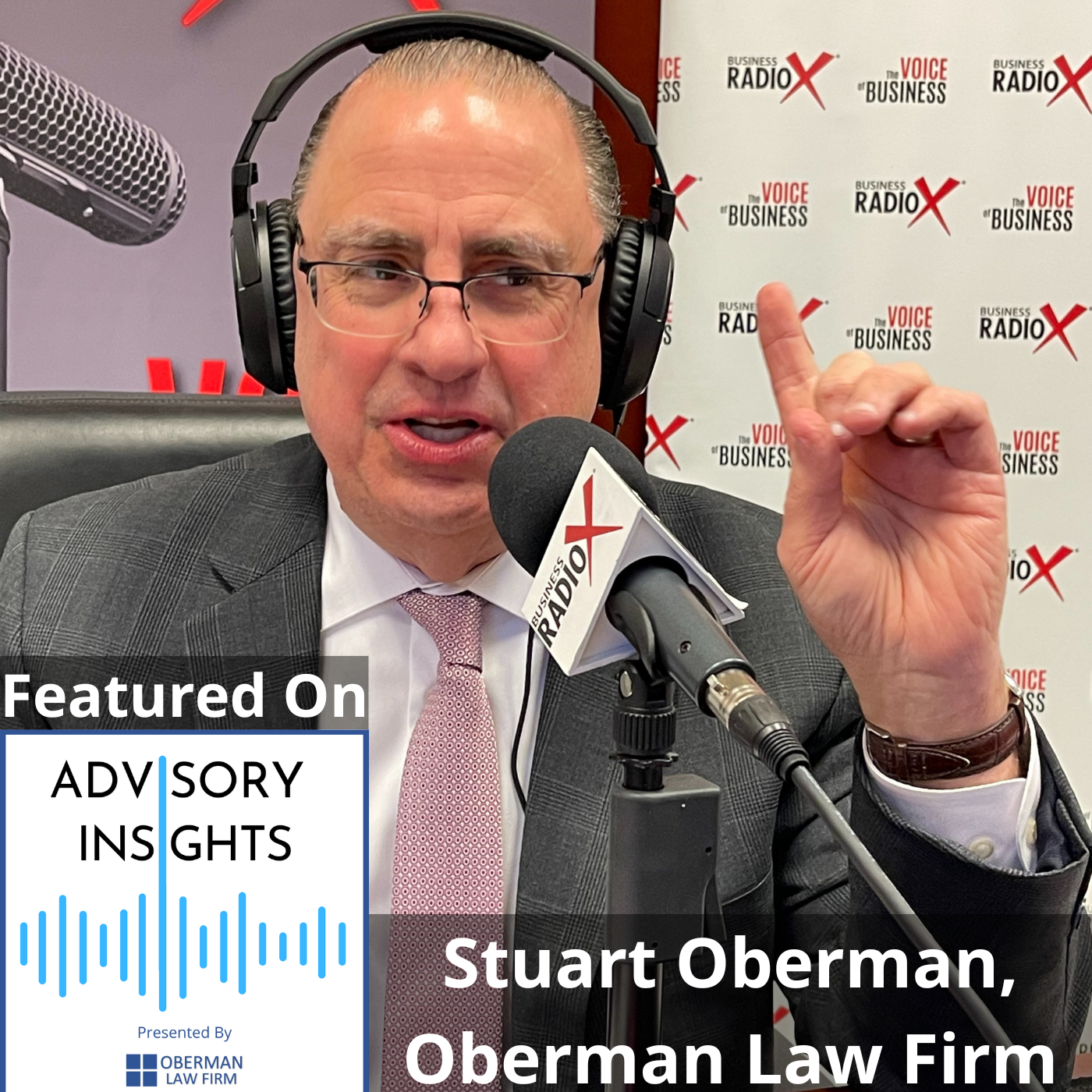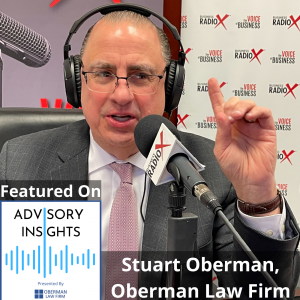

EEOC Guidance on Hearing Impaired Applicants and Employees (Advisory Insights Podcast, Episode 34)
On this episode of Advisory Insights, Stuart Oberman of Oberman Law Firm discussed the EEOC’s guidance on how employers must deal with hearing impaired job candidates and employees. The EEOC is looking at modifications which should be made during the job application and interview process, as well as providing reasonable accommodations once they are hired. Safety concerns must also be considered when making decisions about accommodations.
Advisory Insights is presented by Oberman Law Firm and produced by the North Fulton studio of Business RadioX®. The series can be found on all the major podcast apps. You can find the complete show archive here.
TRANSCRIPT
Intro: [00:00:01] Broadcasting from the Studios of Business RadioX, it’s time for Advisory Insights. Brought to you by Oberman Law Firm, serving clients nationwide with tailored service and exceptional results. Now, here’s your host.
Stuart Oberman: [00:00:20] And welcome everyone to Advisory Insights Podcast. Stuart Oberman here, your host. All right. We’re going to be off and running with some more federal regulation. You’ve got to love these, guys. So, a little known and little talked about guidance here, in January of 2023, the EEOC issued extensive guidance as to what is considered and what employers must do regarding hearing impaired workers and employees.
Stuart Oberman: [00:00:58] So, the EEOC in their published guidance updated the Americans with Disabilities Act, which is quite extensive, which contains information about how the law applies to job applicants and employees who may be hearing impaired, such as deaf, hard of hearing, or have other hearing conditions. Now, this is extremely broad because this particular guidance – which is quite extensive, I might add. I’ve had a chance to review this – is regarding applicants and employees.
Stuart Oberman: [00:01:36] And before we jump into what this is, I want to give an up to date scenario. So, in good faith, you should never put on your application any kind of disability issues, do you have this disability, do you have that disability, are you hearing impaired, those kind of things. That’s an absolute no, no.
Stuart Oberman: [00:02:00] But what do you do if you have an applicant that comes in, extremely qualified on paper, you love this applicant. And then, all of a sudden they’re meeting with you and H.R. people, whatever it is, and you discover that they’ve got a hearing impairment, either they’re deaf, using sign language, or they’re extremely hard of hearing. What do you do?
Stuart Oberman: [00:02:24] There’s a million scenarios that will pop through your mind during that interview. Do you cancel the interview? Do you have that interview only for five minutes knowing you’re not going to hire that candidate for whatever reason? Or do you reschedule that interview and give a good faith interview with an interpreter, if needed, or some kind of software that will assist that applicant with the interview. Or what if you discover you have an employee that’s hearing impaired? What accommodations do you make for that particular employee?
Stuart Oberman: [00:03:08] Look, life happens. You know, things happen. People become blind. People become deaf. They have hard of hearing. I mean, we’re talking about disabilities here. And what do you do? Do you have a mechanism in place for that? Do you have a policy in place? How do you deal with that? These are critical questions.
Stuart Oberman: [00:03:23] So, in the EEOC’s guidance, they answer questions regarding pre and post job offer inquiries, technologies that may enable free or low costs or reasonable accommodations. You know, and you can’t put a dollar amount on this. You can’t say, “Well, I want the cheapest software I can find to accommodate that employee.” You can’t do that. What are the safety concerns regarding this employee? And what are new and potentially updated scenarios? Again, I just gave you some scenarios. But these are much more broader scenarios of potential discrimination that address, again, in this guidance, technologies such as video conferencing software.
Stuart Oberman: [00:04:15] So, here’s a great example. In the world of video conferencing – I don’t want to mention any bigger names or whatever it is. We all know who they are – we all know that remote changed the world and you have video conferencing technology. Are you adapting that technology to employees that have certain potential disabilities or impairments? How are you addressing that on a job interview, where you don’t want that candidate to come in for whatever reason? Let’s say, you want to do a 5 minute, 10 minute, 15 minute interview over a network video conferencing system, how do you handle that? When you get on an interview and you discover that the applicant has a hearing impairment or disability, how do you handle that?
Stuart Oberman: [00:05:03] I think you’ve got to have policies in place. I think you’ve got to have hiring policies in place for this. I think you have to have hiring policies in place to figure out what you need to do to make sure you’re not in violation of EEOC and the ADA for, not only the applicants, but your employees. And I think that your H.R., whether it’s small or large departments, have got to be at the forefront of this, and it’s top down driven. It’s top down driven.
Stuart Oberman: [00:05:33] So, that is a brief, brief podcast, folks, today regarding complex EEOC guidance regarding employees and candidates and applicants that have hearing impairments, disabilities, whatever it may be. Again, folks, it’s a wide topic. I want to have it top of mind. I want to make sure that our H.R. employers are looking at this.
Stuart Oberman: [00:06:00] So, folks, thanks for joining us today, Advisory Insights. Much more legislation to come, I’m sure, regarding the federal issues down the road on this topic. If you have any questions, give us a call at 770-886-2400 or stuart@obermanlaw.com. This is Stuart Oberman, your host, and thanks for joining us and have a fantastic day.
Outro: [00:06:26] Thank you for joining us on Advisory Insights. This show is brought to you by Oberman Law Firm, a business-centric law firm representing local, regional, and national clients in a wide range of practice areas, including health care, mergers and acquisitions, corporate transactions, and regulatory compliance.
About Advisory Insights Podcast
Presented by Oberman Law Firm, Advisory Insights Podcast covers legal, business, HR, and other topics of vital concern to healthcare practices and other business owners. This show series can be found here as well as on all the major podcast apps.
Stuart Oberman, Oberman Law Firm

Stuart Oberman is the founder and President of Oberman Law Firm. Mr. Oberman graduated from Urbana University and received his law degree from John Marshall Law School. Mr. Oberman has been practicing law for over 25 years, and before going into private practice, Mr. Oberman was in-house counsel for a Fortune 500 Company. Mr. Oberman is widely regarded as the go-to attorney in the area of Dental Law, which includes DSO formation, corporate business structures, mergers and acquisitions, regulatory compliance, advertising regulations, HIPAA, Compliance, and employment law regulations that affect dental practices.
In addition, Mr. Oberman’s expertise in the healthcare industry includes advising clients in the complex regulatory landscape as it relates to telehealth and telemedicine, including compliance of corporate structures, third-party reimbursement, contract negotiations, technology, health care fraud, and abuse law (Anti-Kickback Statute and the State Law), professional liability risk management, federal and state regulations.
As the long-term care industry evolves, Mr. Oberman has the knowledge and experience to guide clients in the long-term care sector with respect to corporate and regulatory matters, assisted living facilities, continuing care retirement communities (CCRCs). In addition, Mr. Oberman’s practice also focuses on health care facility acquisitions and other changes of ownership, as well as related licensure and Medicare/Medicaid certification matters, CCRC registrations, long-term care/skilled nursing facility management, operating agreements, assisted living licensure matters, and health care joint ventures.
In addition to his expertise in the health care industry, Mr. Oberman has a nationwide practice that focuses on all facets of contractual disputes, including corporate governance, fiduciary duty, trade secrets, unfair competition, covenants not to compete, trademark and copyright infringement, fraud, and deceptive trade practices, and other business-related matters. Mr. Oberman also represents clients throughout the United States in a wide range of practice areas, including mergers & acquisitions, partnership agreements, commercial real estate, entity formation, employment law, commercial leasing, intellectual property, and HIPAA/OSHA compliance.
Mr. Oberman is a national lecturer and has published articles in the U.S. and Canada.
Oberman Law Firm
Oberman Law Firm has a long history of civic service, noted national, regional, and local clients, and stands among the Southeast’s eminent and fast-growing full-service law firms. Oberman Law Firm’s areas of practice include Business Planning, Commercial & Technology Transactions, Corporate, Employment & Labor, Estate Planning, Health Care, Intellectual Property, Litigation, Privacy & Data Security, and Real Estate.
By meeting their client’s goals and becoming a trusted partner and advocate for our clients, their attorneys are recognized as legal go-getters who provide value-added service. Their attorneys understand that in a rapidly changing legal market, clients have new expectations, constantly evolving choices, and operate in an environment of heightened reputational and commercial risk.
Oberman Law Firm’s strength is its ability to solve complex legal problems by collaborating across borders and practice areas.
Connect with Oberman Law Firm:
Company website | LinkedIn | Twitter















